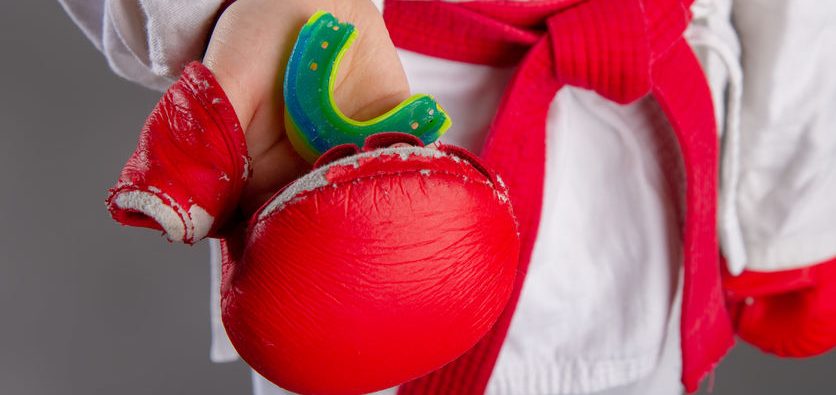Do you or your child play a sport? Do you use a mouthguard? You probably should. They protect your teeth — and could save you thousands of dollars in emergency dental costs.
At our Cleveland dental office, we see dental emergencies related to sports injuries often. In fact, sports-related dental injuries account for more than 600,000 emergency room visits each year, according to the Center for Disease Control. Between 13 to 39 percent of all dental injuries — like chipped teeth, damaged crowns — occur while playing sports.
Mouthguards & Mouth Safety — What You Should Know
Mouthguards provide a protective layer over your teeth while playing contact sports. They keep your teeth intact if you get hit in the face. In fact, an athlete is 60 times more likely to suffer tooth harm when not wearing a mouthguard, according to the American Dental Association.
In addition to teeth, mouthguards also protect lips, cheeks, gums and the tongue from cuts because they cover the sharp surfaces of the teeth during impact. They also reduce the risk for jaw damage or jaw joint fracture because they cushion the entire mouth against impact — distributing forces to avoid injury.
Not only do mouthguards reduce the risk of dental trauma, but they also significantly reduce the cost when an injury does occur.
Not Just Football — Mouthguards are Critical for Most Sports
The American Dental Association, the American Academy of Pediatric Dentistry and the American College of Prosthodontists recommend the use of mouthguards during contact and collision sports. What’s a collision sport? That category is broader than you think — it’s pretty much any sport you might get hit in the face. And that includes most of them.
Parents usually understand why you should wear a mouthguard in football — but despite rules mandating protective gear, only ⅔ of high school athletes are in compliance. And for sports like basketball, soccer, baseball, and softball that don’t have uniform rules on mouthguards, only 7% of athletes wear them. For other sports, it’s even less.
But the highest rate of dental trauma was actually found in basketball — with a risk of broken teeth 5 times that of football, mostly because of the lack of mouthguards.
 In fact, the ADA recommends the use of mouthguards in 27 sports and recreational activities, including bicycling, cross-country running, skateboarding, and surfing. Any skydivers out there? You need one too. Be safe.
In fact, the ADA recommends the use of mouthguards in 27 sports and recreational activities, including bicycling, cross-country running, skateboarding, and surfing. Any skydivers out there? You need one too. Be safe.
The 3 Types of Mouthguards:
- Stock (ready-made) — most common, least expensive, available at most sporting goods stores.
- Mouth-formed (boil & bite) — self-adapting, designed to soften when placed in water & then placed in the mouth when cooled to adapt to your unique bite.
- Custom-made — Fabricated in a dental office or lab from impressions made of your teeth.
What’s the Most Effective Mouthguard on the Planet?
The one that gets worn. Custom-made mouthguards are best designed to protect the unique structures of your mouth but will do little good if hidden in a gym bag while your kid’s on the field. For kids, the cool approach might be your best option.
Check out this awesome Batman mouth guard from Sporting Smiles. RevGear has this cool tie-dyed boil-and-bite mouthguard. GladiatorGuards features these cool mouthguards endorsed by Cleveland native Lebron James. Custom options are available.
We’d be happy to help you out with mouthguards — or fit you for a custom mouthguard. We’re always here to help.


